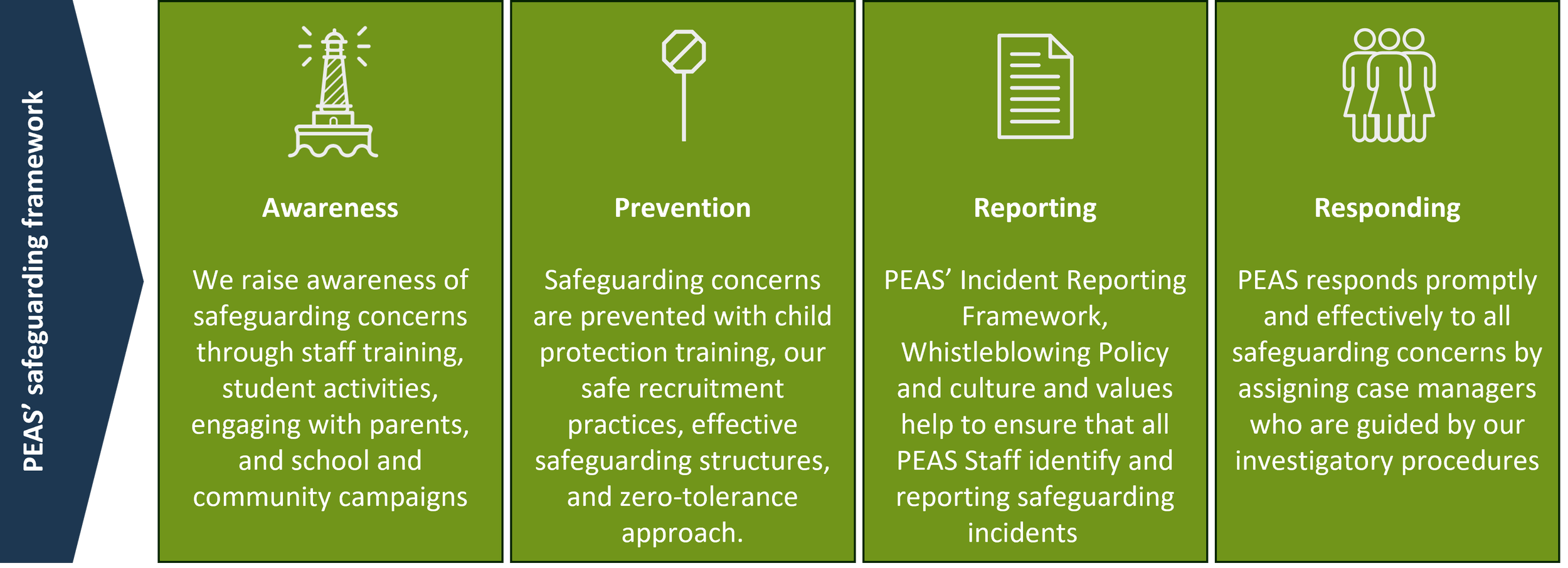We believe in keeping all our students safe and well. Not only is this a human right but feeling safe positively affects young people’s development.
Creating a safe and secure learning environment is crucial for the academic, emotional and social development of students (Kutsyuruba et al, 2015). In Uganda and Zambia, where we run schools, safeguarding concerns such as corporal punishment, bullying between students, and sexual abuse are prevalent and have a significant impact on students’ access to secondary school, particularly girls.
In Uganda, 34% of adolescents are married (7% under 15) (UNICEF (2016), with similar statistics in Zambia. Child marriage reduces the likelihood of completing secondary school by 12 to 23 percentage points (Wodon et al. (2019). While unsafe learning environments have negative effects on learning outcomes (Kibriya et al., 2018).
How do we keep our students safe?
We prioritise the safety of our students and staff through robust safeguarding systems. Our global safeguarding standards, accredited by “Keeping Children Safe”, provides clear guidance and expectations for staff, students, and school visits. Evidence from external evaluations indicate that our schools have stronger child protection policies, training, and implementation than non-PEAS schools (EPRC, 2018), and that our rigorous approach to safeguarding is “positively impacting on the environment for learning” (GEC, 2021).
To ensure consistency, we have trained Child Protection Focal Point Persons at school, regional, country, and global level. Each school has appointed male and female Focal Point Persons, who coordinate responses to safeguarding incidents, ensuring that appropriate actions are taken to address the situation, support the affected student, and follow the relevant reporting procedure.
Recognising the importance of addressing girl-specific issues, we have trained Senior Woman Teachers (SWT) as female child protection focal points. SWTs receive ongoing training to oversee the physical and emotional welfare of female students and build the capacity of other teachers to support girls’ health and well-being. Their role in empowering female students has proven significant, with an external evaluation showing that engagement with SWTs not only improved girls’ confidence, but increased their odds of developing reading and writing skills by 264% (GEC, 2021).
We take a zero-tolerance and student-centred approach to Safeguarding and Child Protection. We deliver this by creating robust policies, training, and support to protect our students. This is then monitored through regular data collection, based on safeguarding standards, and strengthened through collaboration with local government, community development officer and the police.
Our approach to safeguarding is structured around four key areas:

What are we doing to keep our students safe beyond the school environment?
We recognise that students’ attendance, especially girls, is negatively impacted by the harassment they face on their way to school, and we’re working to address this. PEAS data shows a positive link between girls feeling safe on their way to school and exam results, highlighting the importance of tackling this issue for their well-being and academic success.
To improve student safety during their commute, we have partnered with the World Bicycle Relief to launch an innovative pilot programme called Cycling for Success in two PEAS Zambia Schools. Thanks to generous funding from the Costa Foundation, we have provided 240 purpose-build Buffalo Bicycles to the most marginalised day students who travel more than 3 kilometres to reach school, with 60% allocated to girls. The bicycles supplied are engineered to withstand rural terrains, heavy loads, and long distances. Over the next 12 months, this programme aims not only to enhance student safety, but also to improve attendance and retention rates, self-confidence and study time, ultimately enhancing learning outcomes.
If you’re interested in finding out more about our approach to creating safe learning environments, please contact info@peas.org.uk.